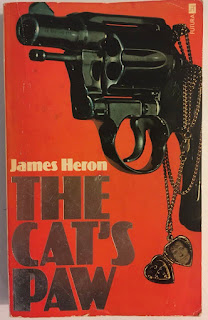Berkeley, CA is lousy with free book boxes. There are three within a block or two of my parents house and you can't go for a walk of any distance without encountering one. Fortunately for me now, most of the content is of the literary fiction variety, though I did find a couple of older somewhat interesting paperbacks that I might have picked up in times of a lighter on-deck shelf. It is still fun to check them out and adds a little fun to an already pleasant walk (though it has lost its funkiness and gone depressingly upscale, Berkeley still has the most beautiful residential neighbourhoods in probably the world).
I finally gave in against my better judgement (and goal to read the books I brought with me on this trip) and picked up this first edition hardback. It seemed like one of those enjoyable, readable mysteries of the 80s that always have the subtitle "An [name of slightly interesting regional detective with an ongoing mild personal drama] mystery". In this case, the detective is Sheriff Emil Whippletree of St. Cloud, Minnesota. He is a very likable sheriff, easygoing and flexible with his men, the kind of hero you want to doggedly keeping plugging away at a murder while more powerful, nefarious forces try to stymie his investigation.
The investigation here begins first with the wife of a professor at the local private university (Christian, big football team) having a vision just outside the stadium which holds up traffic to the big game. Emil then discovers in the forest nearby the body of a coed, neck and wrists broken, possibly violated. She was part of a special seminar group that had studied late on Friday and all the students are suspects. This leads us to a fairly complex (but not too hard to follow) tangle of threads including a conservative department head trying to ouster a young liberal professor, the charismatic president of the university running interference on the investigation while his vice-president seems to be jockeying for his own run at the presidency, the head of campus security threatening to run for sheriff at the next election, Emil's own niece being in the class of the murder victim, the growing crowd of worshippers coming to see the visions and on and on. There is a lot going on in this mystery and it keeps the pages turning. It is all kind of masculine, not in a big macho way but just that the women all are in secondary roles. Emil's wife in particular seems very endearing but really only adds colour (though pleasant colour). This was also written in the time before police departments became standing armies. It is a nice escapist fantasy to think of a under-budgeted Sheriff who knows everybody in town and makes decent-minded judgement calls. Not a person of colour in sight, and though it is Minnesota, I do feel it had some ethnic diversity in the mid 80's.
I found the solution to be not quite as complex and intertwined as the tangle of narrative threads had suggested. It was also wrapped up with a plot flourish that seemed a bit contrived. That's all okay, though. This is a solid, enjoyable regional mystery. I would check out another Emil Whippletree book if it crossed my path.
Oh very funny, I read a bio of the author and it turns out he has also written historical romances under the nom de plume of Vanessa Royall. I thought that the name rang a bell and then I realized that Emil's wife is reading a book by her in this book! Well played, Mr. Hinkmeyer. :)
And not so funny, found that Mr. Hinkmeyer passed away the year before last (just missed the pandemic). Sounds like he ended up having a good life for himself, living in the Hamptons year round on his writing money.














